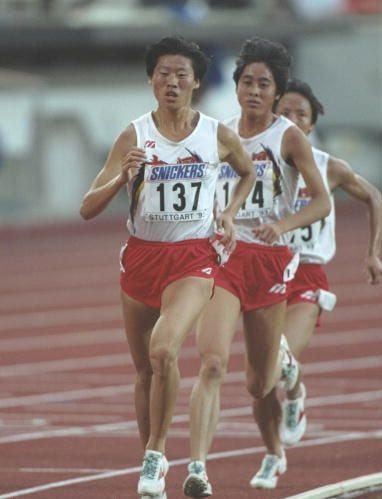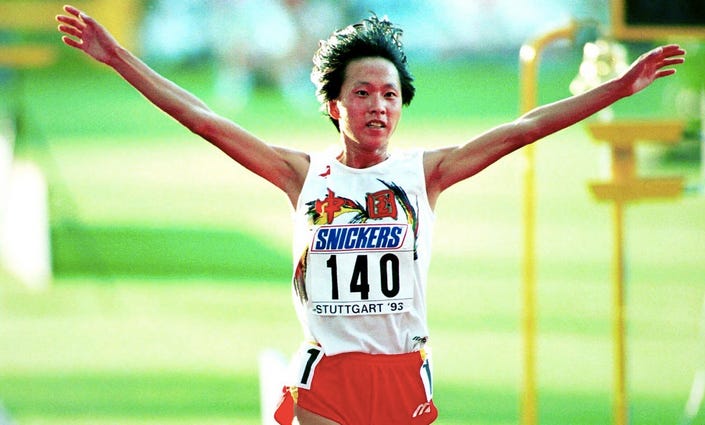Running/Planning
No apologies for sharing another curious obsession, this time with how Wang Junxia and the Chinese runners of the 1990s have helped steady my nerves. Plus event news.
I’m just back from a run, a cold twilight trot around part of Milton Keynes Bowl and a lake, watching silhouettes of geese on the dark water, trainers squelching over wet leaves. Running might be a relatively recent activity for me, thanks for Couch to 5k and general diabetic malaise, but it’s an interest I’ve had for many years. An interest that has helped keep me sane. Some people drink to keep the anxieties of our fractured age at bay. For my mental health I delve into the Wikipedia pages of retired communist runners.
A song on CMAT’s recent album Euro-Country has been rattling round my head for weeks. ‘I keep on running, planning, running planning,’ she sings. The lyrics are about the pressure women face to pursue self-improvement and relationships, a kind of idealised version of self that can’t be reached. Running and planning, here are two things I also understood, though not in the way CMAT means, I thought.
But letting the song steep away around my brain for a time, it begins to feel less its own thing, and more something I am tangled up with. I love how art can do that, be about something very specific to the artist and then over time become intensely personal to us too, for quite different reasons. The best art feels as if we have been given a new element on the periodic table. Once we understand it we can begin to mould it to our own use. For me, Running/Planning takes me back decades, and illuminates a seemingly inexhaustible curiosity I have about something that happened to people I have never met, and events I have absolutely no connection to at all.
It’s 1993. I’m at my parents’ home, just back from finishing a Media Production degree in Bournemouth and not sure what the future might bring. Perhaps I could end up working in film or TV, like the fellow student who turned out to be Peter Greenaway’s niece, say. But my mum worked for Dial-a-Ride and my dad was a handyman, so instead, how about I get a job back in a bookshop, just like I had before I went to poly? That wasted summer I escaped into TV in a different way from my course, watching everything, videoing random stuff, trying to pin the world down through comedy, drama and documentary in an era of boxy drab John Major nothingness. That August it was the World Athletics Championships from Stuttgart, and I’ve always loved watching athletics, particularly middle and long distance races. I thought I was a bit of an expert, but all I really knew was what those avuncular commentators on the BBC told me about it. And that, it turned out, wasn’t much.
I settle down to watch the women’s 3,000 metres final. Yvonne Murray and Paula Radcliffe are running for Britain, and I’ve been slightly obsessed with Murray, her slight form belieing a kind of temperamental, emotional genius that every so often does remarkable things. I suspect Yelena Romanova, the Russian runner, will spoil the day for Murray, just as a succession of Soviet athletes had a few years before that. Or perhaps the Irishwoman Sonia O’Sullivan will do it: she’s been running so well on the circuit all summer, I note, wisely. But eight and a half minutes later my faith in all I thought I knew about this event – and athletics more generally – is completely crushed.
Three runners I have never heard of, Qu Yunxia, Zhang Linli and Zhang Lirong, in the basic white vests and red shorts of China, storm to the front with over a lap to go, pull well clear as a group, and thunder home with a kind of sturdy confidence that feels quite at odds with the strained red-faced Murray or the awkward bobbing head of Paula Radcliffe. I’d not paid much attention the previous year when Qu had won a bronze medal at the Olympics in the 1,500 metres. If you watch a lot of athletics you get used to the odd random medallist. But suddenly there was nothing so random about her previous form. Instead China, a country with – to me – seemingly little international standing in athletics at this level, had achieved a remarkable clean sweep in the 3,000 metres, and I didn’t really know what to make of it. Well, I did. Cheats, I thought, even before they’d crossed the line, all that distance ahead of those familiar names in who I was so invested. And I felt a curious sense of something being personally robbed from me: not some patriotic medal-loss, but knowledge. A sense that perhaps I didn’t actually know anything about this sport at all. Watching athletics for over a decade hadn’t made me any sort of expert. Who were these women? What did I know about China? I knew nothing.
It was the norm back then for Russian athletes, having not raced at all on the European circuit, to seemingly come from nowhere. Women with names that were hard to pronounce and impossible to forget. Nadezhda Olizarenko. Olga Bondarenko. Tetyana Dorovskikh. Each a beautifully discordant sound, like a passage from the Rite of Spring. Soon the names of these Chinese runners would be stuck in my head too, sung like the rhythmic call of running, planning, running, planning.
That wasn’t the end of my surprise. Five days later it was the women’s 10,000 metres. This time it was an even more remarkable run, by Wang Junxia, a woman who’d later become known in China as the Oriental Divine Deer, a 19 year old who burned up the track in the last half of the race, powering to the kind of victory we’re more used to seeing these days from runners from Kenya and Ethiopia, but back then just felt crazy, supernatural. A long way back her teammate Zhong Huandi took the silver medal. Apparently they didn’t get on.
The next day it was the final of the women’s 1,500 metres, and if by now even I knew what to expect, so did the other runners, and the crowd. Lui Dong, Lü Yi and Yan Wei took to the front of the race after a couple of laps, and the Stuttgart crowd began to jeer, airing a mixture of suspicion and, it seemed, not a little racism. It was Lui Dong who won this time, a flash or red and white way out ahead of the rest, Sonia O’Sullivan taking a consolation silver medal, with the Olympic champion, Algeria’s formidable Hassiba Boulmerka, battling for a distant third.
A couple of weeks later in Beijing this group of remarkable Chinese women broke world records in all three of these distances, often with several of them surpassing the previous bests – not just in the finals of their national championships, but in the heats too. It was widely reported with scepticism and bafflement. All three records would last for over a decade, Wang Junxia’s 3,000 metres one still unbeaten today. For the most part they were trained by Ma Juhnren, who referred to them as his family army and made them run a marathon a day. Wang Junxia would later lead a rebellion among the young women, and told the world how their coach withheld winning fees and terrorised them. He claimed their achievements were due to drinking turtle blood, and to eating certain mushrooms. If that was the case it didn’t stop most of the team becoming injured through his relentless over-training, ending spectacular but brief careers before many of them had even reached 23. Only Wang Junxia made it through to the Olympics in 1996, where she won a gold and a silver while training under a new coach. She retired immediately after. Ma responded to Wang’s rebellion by bringing on a completely new batch of young runners in 1997, who again set incredible times (Jiang Bo’s 1,5000 metre time makes her still the sixth fastest ever). But none of them made it to the 2000 Olympics either, Reuters reporting that six of his runners were dropped because they failed drugs tests.
-
It’s 2025, and I have found a way to manage my anxiety. Going to bed over-tired, I’m worried I’ll drift off and then be wide awake an hour later, unable to sleep for the rest of the night. One evening I looked up Wang Junxia, out of curiosity, reading her Wikipedia page on my phone as I lay in bed, and clicking through the links, the races, the coach, the other runners, trying to understand something more about these mysterious figures on the edge of my memory. And somehow reading about Ma’s Family Army became strangely comforting. Trying to illuminate half-remembered snapshots in my head, relearning about what had happened, and seeing it with new (admittedly tired) eyes. They have become my dream guardians, the Oriental Divine Deer guiding me to restful sleep. Wang herself appears eminently Googlable: three marriages, one to a record producer, her first to an ex football star; she played the lead in a movie; she lived in the US and now Hong Kong; and she was the rebel who led the fight against their coach, and half-exposed the pressures they were put under. Now she’s the unexpected hero to a gay geek in Milton Keynes.
And I still think her story and that of her compatriots is remarkable, drugs or not. It feels audacious, like the Brinks Mat robbery. I also find it curious that it’s remained largely untold. But none of that really explains why, all these years later, I am quite so fascinated by these women. Perhaps it’s because these runners appeared and vanished so quickly, and unlike racy Wang Junxia most have just left only their names, written all over the record books to remind us of their feats. And by ‘us’ I often think I mean ‘me’ because I’ve certainly never had a conversation about them with anyone, or ever heard anyone mention their names. If you read about them on any running forum you get the usual bombastic blanket dismissal, designed to kill off any curiosity. Drug cheats. Nothing to see here. It reminds me of so many of my interests, I seem drawn to things other people dismiss. Do I like them, I wonder, in the same way I’m fascinated with tower blocks and post-war planning? Are they all part of an ethic and an aesthetic that summons up a completely different way of living from the near past? After all, aren’t they simply the product of another form of planning? Not towns or neighbourhoods, but culture and sport – something equally driven by the ambitions of politics.
More broadly, I’ve often wondered why I admire women runners more than their male counterparts. Now it’s Sifan Hassan or Faith Kipyegon who keep me hooked to watching athletics, but right back to my childhood I was always much more interested in women runners than men, even if the men were hot, which they almost inevitably were not. In those days the commentators would refer to women athletes as girls, and offer little in the way of informed insight into people who were doing remarkable things that we didn’t really understand. And back then, in the 1970s and 80s these women were usually a parade of East Germans, Soviets and Czechoslovakians: Sigrun Wodars, Tatyana Kazankina, Jarmila Kratochvílová. The experts never seemed to know much about them, and talked of these women less as individuals and more as part of a bloc. State-sponsored doping is what we learned to say about these runners, as if there was nothing interesting to see beyond that. No actual individuals, no stories, nothing.
As I pound around the planned lakes and landscapes of Milton Keynes in my New Balance, I think of Wang Junxia, Qu Yunxia, Lui Dong and the rest. They are products of a different era. It’s easy to say drugs cheats and dismiss the lot, and perhaps none of their times and records should stand. But what lives they must have lived, caught in a turbulent moment in geopolitics, the Cold War and after, where sport acted as a proxy for something worse. To dismiss them so readily ignores the extraordinary forces that produced them, the pressures that used them for other ends, young women pushed forward by a system, urged on to win for the glory of their homelands, and to inflict defeat on the enemy. They become ‘The Chinese’, ‘The Russians,’ ‘The East Germans.’ Not people, just objects dismissed as part of an inhuman organisation. Which takes me back to CMAT and Running/Planning, in which she sings ‘It runs along on a loop, It runs along as is truth, Along the bottom of the news, That I’m not good enough for you.’ Those pressures to be better, to strive harder, to push further, to be someone you’re not for men who don’t even appreciate you, the individual. But a lack of curiosity about these runners as people, young women who must have experienced the most extraordinary things now leaves a massive void in our understanding of what actually happened back then, and of what the world was like. Or perhaps that was precisely what the world was like, profoundly uncurious about the achievements of young women – for good or ill – when it was easier to write them off as the puppets of men and the state.
What must it have been like, to be part of that moment, and to win, to take on the world and beat everyone? Imagine how thrilling and terrifying that must have been. I scroll down these sparse Wikipedia entries and poorly translated news articles in the hope that something will open up, a portal to meaning and connection that will make all of this feel like it makes sense, just as I do with all those old planning ideas. But then history seldom ever does make sense – well, not until we shape it into our narratives. And perhaps what fascinates me most about these runners is that I probably will never hear what it was like. They have jobs, families, lives, they’re all roughly my age, middle fifties now, and live thousands of miles away, often in relative anonymity, and speak a language I don’t understand. All I can catch are the glimpses these fragments of data and old video can give me. And that seems enough for my dream state.
On the worst of my anxious days I rewatch those races from Stuttgart, and wonder at the audacity of Wang Junxia, Qu Yunxia, Lui Dong and the rest. Heroes at home, villified or forgotten everywhere else, reduced to symbols by an incurious world. In the meantime, this secret obsession roars on in my head, and as I slip into unconsciousness the rhythm of those footsteps drives through my dreams. I’ll keep on running, planning, running, planning…
Song of the Suburbs
Firstly, thanks so much for such a lovely reaction to my next book, Tales of the Suburbs, out in March 2026.
Related to that, on December 10th I’ll be with the Modernists in Manchester for the screening of a new short film, Song of the Suburbs by Graham Williamson, and interviewing him about it. Event details here.
Among the things you’ll see in this film are: extreme slum clearance allotments, the foundation of the welfare state, poltergeists in suburban London, the North Korean embassy in a suburban semi, the rise of new towns, the fall of the high-rise flat, solstice rituals at Milton Keynes, house name plates, extremely dangerous children’s games, a house shaped like a UFO, a child stroking a caterpillar, and a man who has redecorated his entire home in 1970s fashions.
Do come along, the film is extraordinary and beautiful.
Municipal Monstrosities Mon Amour
Don’t miss John Boughton, author of Municipal Dreams, on the latest Monstrosities Mon Amour podcast, talking about his love for Thetford and white bread… You can listen here.
Be seeing you!







This resonated with me more than I expected. The way you use Wang Junxia and those Chinese runners as a kind of mental refuge is brillant. I've had similiar obsessions with obscure atheletes or historical moments that just become a loop in my head when things get too anxious. Those 1993 races must have been absolutly wild to watch live without any context.
Do you know if the film, Song of the Suburbs, will be shown elsewhere? Or how to find out?